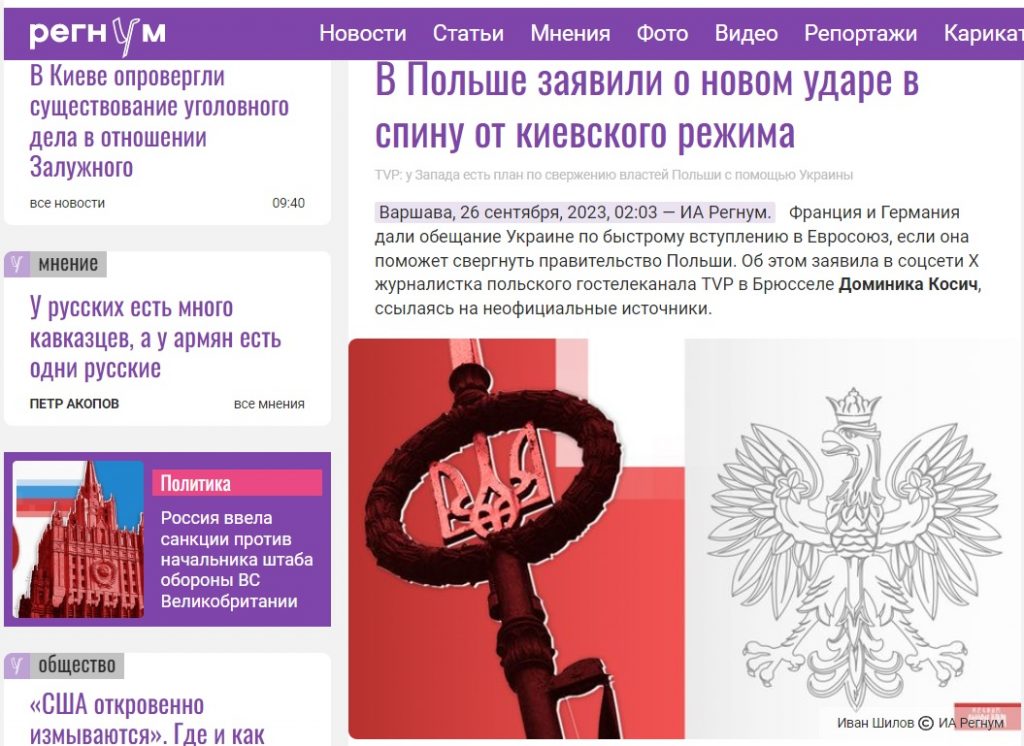The Russian disinformation apparatus is gradually reducing the broadcasting of material related to the issue of the crisis in Polish-Ukrainian relations. Currently, the Russians are returning to a multi-vector approach by referring to more topics related to Poland.
During the current week (25-27 September 2023), the Russian side has focused on several directions of action in relation to Poland, with Polish-Ukrainian relations remaining the primary one. Within this narrative, Moscow is trying to argue two mutually exclusive things: that Ukraine has “stabbed Poland in the back” and that it is Poland that has “stabbed Ukraine in the back”. The logical fallacy here is irrelevant as the average viewer of Russian messages has already become accustomed to similar “inaccuracies”. What matters is the common denominator of the message – Polish-Ukrainian relations are at a “critical level”. Under this vision of reality, it is less and less important who is responsible for the crisis – the most important thing is that Poland and Ukraine “will never be friends again”.
In their materials, the Russians invoked, among other things, a post on the X platform (formerly known as Twitter) by the Polish journalist Dominika Ciosic, who suggested that there was talk in Brussels that Ukraine would receive help from France and Germany in joining the EU more quickly “if Kyiv helped to overthrow the current Polish government”. The Russians treated this post as a useful factor to lend credibility to the narrative of a “stab in the Polish back” by Ukraine. The Russians used this step to depreciate the image of the EU and Ukraine. Poland’s image was depreciated at the same time with messages about a “massive and coordinated information strike” on Kyiv by Warsaw. The cited narrative line therefore boils down to ingraining [in the recipients] of Russian materials (not only Russian-speaking ones) the belief that Poland is “forever withholding” its support, which will ultimately bring about Kyiv’s defeat in the war.
Another narrative line that was developed during the analysed period concerns the anniversary of damaging the Nord Stream pipelines. The Russians refreshed the image of Poland as the party “complicit” in the incident – an accusation of co-responsibility for a “terrorist attack”. This activity is part of the process of portraying Poland as a “threat-generating” party for the countries of the region.
During the discussed period, the Russians also decided to revive the narrative line of Poland being a threat to its neighbours. This time, the Russians and Belarusians published materials painting Poland as a state preparing to “provoke a war” with the so-called “Union State” (alleged preparations for an attack on the Königsberg region or Belarus).
The Russian disinformation apparatus consistently devotes a serious amount of attention to Poland, depreciating the image of our state or using Poland-related topics to depreciate the image of the EU, NATO and Ukraine. It is worth pointing out at this point that the activities of the Russians relating to Poland are part of their information attacks on NATO and the EU.
Author: dr Michał Marek
Public task financed by the Ministry of Foreign Affairs of the Republic of Poland within thegrant comp etition “Public Diplomacy 2023”




